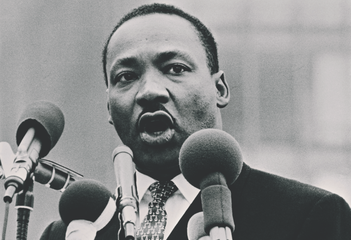|
Today, we celebrate and remember Dr. Martin Luther King. We celebrate his life. We remember his death. We give thanks for his legacy of standing up for racial equality and the dignity of every human being. And, we recognize that, just like Martin Luther King, we are followers of Jesus. Therefore, we are called to follow Dr. King’s legacy and to continue to stand up for equality and to respect the dignity of every human being.
The scriptures chosen for the commemoration of Dr. King give us clear guidance about how we can go about this. The section of Luke’s gospel chosen for today is from Jesus’ Sermon on the Plain, and it reminds us that Love is the basis of all our actions as Christians. And the section from the Letter to the Ephesians lays out for us the tools at our disposal to be “proclaimers of the Gospel of peace.” To begin, I want to give us some highlights from the life of Martin Luther King. I’ll follow with more information about both the Gospel reading from Luke and the reading from Ephesians. And we’ll conclude with what all of this means for us in our world today. Martin Luther King was born in Atlanta, in January 15, 1929. He was an American Baptist minister and activist who became the most visible spokesperson and leader in the civil rights movement from 1954 until his death in 1968. He is best known for advancing civil rights through nonviolence and civil disobedience, tactics his Christian beliefs and the nonviolent activism of Mahatma Gandhi helped inspire. King led the 1955 Montgomery bus boycott and in 1957 became the first president of the Southern Christian Leadership Conference (SCLC). With the SCLC, he led an unsuccessful 1962 struggle against segregation in Albany, Georgia, and helped organize the nonviolent 1963 protests in Birmingham, Alabama. He also helped organize the 1963 March on Washington, where he delivered his famous "I Have a Dream" speech. On October 14, 1964, King won the Nobel Peace Prize for combating racial inequality through nonviolent resistance. In 1965, he helped organize the Selma to Montgomery marches. The following year, he and the SCLC took the movement north to Chicago to work on segregated housing. In his final years, he expanded his focus to include opposition towards poverty and the Vietnam War. In 1968, King was planning a national occupation of Washington, D.C., to be called the Poor People's Campaign, when he was assassinated by James Earl Ray on April 4 in Memphis, Tennessee. (Summarized from Wikipedia) As I read and re-read some of Dr. King’s great speeches this week, it was clear to me that the value at the core of Dr. King's speeches was love. Whether he was dreaming of a world where his children would be judged by the content of the character rather than by the color of their skin, or looking out from the mountain top to a promised land where justice and equality would prevail, what motivated Dr. King was love. Love of God. Love of people. Love. It’s that same love that Jesus talks about our in Gospel this morning in this excerpt from his Sermon on the Plain. It’s important for us to remember that the love that Jesus is talking about, the love that motivated Martin Luther King, and the love that fires our own actions for justice is not the romantic feeling of love. In Greek, there are several words that we translate into English as love, and this one today is AGAPE. One of the best translations of AGAPE is “the love that builds community.” It’s sometimes called Christian love. AGAPE is not a feeling. It’s an action fueled by choice. If I have to wait until I feel love for my enemy to love them - or I feel love to do good to someone who hurts me, it’s all over. Honestly, I’m never going to feel that. But, I can make a choice to act in a loving way or to pray for someone who hurts me, whether I FEEL it or not. If we move on to the letter to the Ephesians, we are given some clear direction from the author (who was either Paul, or one of his disciples writing in his name after his death) about how we prepare ourselves to face the challenges of the world. The writer begins by describing the kinds of evil that permeate the world. And then he encourages the Ephesians to prepare themselves, as if for battle, by dressing (metaphorically) in battle armor. And while this imagery sounds like it’s the OPPOSITE of love, we can see that, in fact, this armor equips them (and us) to battle against with evil with love (and remember, this is love that’s an action - love that builds community). The writer describes this armor, in the order a first century soldier would have put it on:
In many ways, our world is very different from the world that Jesus faced. It’s different from the world that Paul and his companions in Ephesus faced. It’s even different from the world that Martin Luther King faced. Our country has made some great strides in equality and in fighting injustice. However, if you read the news, or watch TV, or listen to NPR, it doesn’t take long to see that we continue to face real battles against what I would call the forces of evil. People of color still face discrimination in our country. Perhaps you heard this week about a story of two young African American men in a Starbucks in Philadelphia. They were waiting for a third friend to arrive. Six police officers came and removed them from the Starbucks because they were not buying coffee (coffee their friend was planning to buy). How many of us here today have waited in Starbucks for a friend who was going to buy our coffee and have been removed by police because we haven't bought anything? Anyone? I thought not. Privilege and discrimination. We have a long way to go. In addition, our government seems to be in disarray. In Syria and Sudan and countless places around the globe, people are being slaughtered. We hear about wars and rumors of wars. In our communities, opioid use is on the rise, people are being trafficked, and kids go to school hungry every day. Dealing with so much of this is well above my pay grade. It’s easy to feel discouraged. And I don’t know about you, but I know that I’m not Jesus and I’m not Martin Luther King! But, I do know that I am a Christian - a follower of Jesus. We are all Christians - all followers of Jesus. I know that our call is to love - with the love that builds community. We are called to love with the love that is an action - a choice. And our call is to fight evil in whatever way we can by equipping ourselves with those armaments - things like Truth, Righteousness, Peace, Faith and the Word of God. Let me tell you what I am doing these days to fight despair. I'm to telling you this because I'm some kind of exemplar. I'm sharing this because I hope it might be helpful. What I’m trying to do these days is to choose one or two areas where I feel the Spirit nudging me - local things right in our own community and some with a broader scope. I focus on them in my prayers. I donate what I can. I take action when I am able. And I fight the discouragement I sometimes feel about how far we still have to go by wrapping myself in that armor and choosing to love. In the name of Jesus, with the memory of Martin Luther King fresh in our minds, I invite you to do the same.
1 Comment
9/14/2019 02:40:33 am
I don't know why I am working a bit slowly lately. Maybe it's because I am no longer pressured to earn more than my normal work load. I guess I am semi retired. I don't know if that term fits it correctly but I am retired in a sense that I don't have the usual drive to earn as much as I used to even if I need it more now. I feel I am ready to die anytime and if there's anything I want to do right now, I just want to be with people I like staring at at least and love from a distance.
Reply
Leave a Reply. |
AuthorI'm Fran Gardner-Smith. I'm an Episcopal priest, a wife, a grandmother, a feminist, a writer, and an artist. Archives
April 2020
Categories |




 RSS Feed
RSS Feed